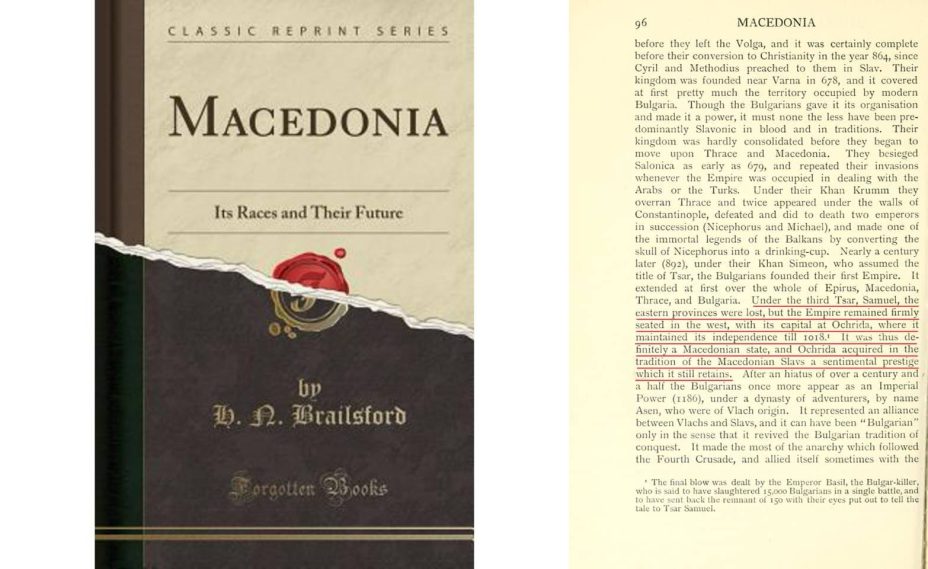• Pgs. 18-19 •
The layman was an ardent Macedonian nationalist, rather
distrustful of Bulgaria, and profoundly hostile to Russia. The
description was good and accurate.
• Pg. 80 •
Macedonia which revolts, which claims to be a unity and asks for
autonomy—there are neither Greeks nor Turks.
• Pg. 96 •
Under the third Tsar, Samuel, the eastern provinces were lost,
but the Empire remained firmly seated in the west, with its
capital at Ochrida, where it maintained its independence till
1018. It was thus definitely a Macedonian state, and Ochrida
acquired in the tradition of the Macedonian Slavs a sentimental
prestige which it still retains.
• Pg. 101 •
Are the Macedonians Serbs or Bulgars? The question is
constantly asked and dogmatically answered in Belgrade and
Sofia. But the lesson of history obviously is that there is no
answer at all. They are not Serbs, for their blood can hardly be
purely Slavonic. There must be in it some admixture of
Bulgarian and other non-Aryan stock (Kuman Tartars,
Pechenegs, &c). On the other hand, they can hardly be
Bulgarians, for quite clearly the Servian immigrations and
conquests must have left much Servian blood in their veins, and
the admixture of non-Aryan blood can scarcely be so
considerable as it is in Bulgaria. They are probably very much
what they were before either a Bulgarian or a Servian Empire
existed—a Slav people derived from rather various stocks, who
invaded the peninsula at different periods.
• Pg. 105 •
The legend that Macedonia is a Greek province like Crete and
Cyprus, a true limb of Hellas Irredempta, is firmly planted in the
European, and especially in the English, mind..
• Pg. 113 •
The insurgent movement is in reality a genuine Macedonian
movement, prepared by Macedonians, led by Macedonians, and
assisted by the passionate sympathy of the vast majority of the
Slav population.
• Pg. 120 •
Important as the activities of the Macedonian Committee have
been and may again be in Bulgaria, they have never gone so far
as to compromise the genuine Macedonian character of the
movement. It had its origin not in Sofia, but in the little country
town of Resna. It is led not by Bulgarians but by Macedonians.
• Pg. 122 •
But the other Macedonian stocks are not peoples of the soil.
The Albanians are recent invaders. The Vlachs are nomad
herdsmen, wandering carriers and cosmopolitan merchants,
whose families are scattered all over the Levant. The Greeks are
townsmen, reared on abstractions, who care nothing for the soil
of Macedonia, and very much indeed for ‘Hellenism.’…
Their ballads of revolt, in which the word ‘Macedonia’ recurs in
every chorus, prove that they already have a fatherland.
• Pg. 124 •
The Committee, or some sections of it, even contemplates the
policy of imposing the Macedonian Slav dialect in place of
literary Bulgarian as the language of all the Exarchist schools in
Macedonia. Grammars are said to have been printed for this
purpose. This seems to me to prove the sincerity of the local
autonomist patriotism.
• Pg. 194 •
But the other Macedonian stocks are not peoples of the soil.
The Albanians are recent invaders. The Vlachs are nomad
herdsmen, wandering carriers and cosmopolitan merchants,
whose families are scattered all over the Levant. The Greeks are
townsmen, reared on abstractions, who care nothing for the soil
of Macedonia, and very much indeed for ‘Hellenism.’
• Pg. 201 •
But even the more educated and moderate Greek, who admits
frankly that the Macedonians are Slavs, will add a claim on
behalf of Greece to more territory than her sons inhabit, ‘in
recognition of the civilizing mission of Hellenism.’
• • •
Тие се народ врзан за почвата, вкостени во своите села со ограничен опсег на чувства, кои побожно се вртат околу нивните планини, нивните реки и нивните древни цркви. Нација на селани, што тргнува со вакви конзервативни одлики, бргу ќе развие вистински патриотизам… Нивните балади за бунт, во кои зборот „Македонија“ се јавува во секој рефрен, докажуваат дека тие имаат татковина.

